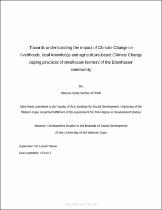| dc.description.abstract | Climate Change (CC) is arguably the most pressing topic of our modern society. The acceleration in magnitude and frequency of climate variability associated with it, along with the overall change of climate patterns threatens to push their adaptive capacity to breaking point, hinting at the significant impact that CC will have on the livelihoods of small-scale farmers of the developing world, and on South Africa in particular. This research project aims to investigate how local knowledge and agriculture-based coping practices of small-scale farmers of the Ebenhaeser community are adapted to deal with and attempt to reduce the vulnerability of their livelihood strategies to CC. This illustrative study followed a qualitative methodology, using qualitative data collection (in-depth and semistructured interviews, as well as special focus group discussions) and analysis (thematic ordering) methods to fulfil its aim. This study revealed that local farmers were able to identify changes in climate which were hazardous to their livelihoods and that they have been developing coping practices in response the CC. Furthermore, this analysis showed that local small-scale farmers used their local body of knowledge as a basis for the development of these coping practices, and that this local knowledge base itself has been affected by CC. An important finding of this study was the extent to which local social, historic, economic, political and physical conditions influence the sensitivity and adaptive capacity of the smallscale farmers of the Ebenhaeser community. The findings of this study opened our eyes to the realities of CC and its impacts on and adaptation efforts of small-scale farmers of the Ebenhaeser community. The study show ed that unless these issues are addressed in a comprehensive and holistic manner, there is no real prospect of sustainable, long-term CC adaption solutions for the small-scale farmers of this area, and conceivably none for many more rural communities in South Africa. | en_US |

